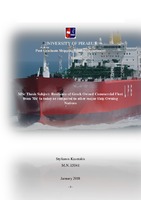Η ανθεκτικότητα του ελληνικού εμπορικού στόλου από τη δεκαετία του '70 μέχρι σήμερα σε σχέση με αλλά έθνη που κατέχουν εμπορικούς στόλους
Resilience of Greek owned commercial fleet from 70s’ to today as compared to other major ship owning nations

Master Thesis
Συγγραφέας
Κασωτάκης, Στυλιανός
Kasotakis, Stylianos
Ημερομηνία
2018-01Επιβλέπων
Πολέμης, ΔιονύσιοςΠροβολή/
Λέξεις κλειδιά
Ελληνόκτητη ναυτιλία ; Ναυτικά κράτη ; Greek shippingΠερίληψη
Τί χρειάζεται για να διακριθεί ή και να πρωτεύσει κάποιος σε ένα συγκεκριμένο τομέα δραστηριότητας;
Οι ‘εύκολες’ - και ίσως στερεοτυπικές - άμεσες απαντήσεις θα μπορούσαν να είναι ότι τα ‘χρήματα πάνε στα χρήματα’ – συνεπώς κάποιος που έχει γερά οικονομικά στηρίγματα έχει αυξημένες πιθανότητες να επιτύχει – ή ότι η ‘κρίσιμη μάζα’, το μέγεθος, μετράει – άρα οι μεγαλοι όμιλοι ή ακόμα και ολόκληρες χώρες έχουν την επιρροή και τα μέσα να επιτύχουν τους στόχους και τις στρατηγικές τους. Αυτές οι απαντήσεις δεν είναι λάθος, η επιρροή και η οικονομική ευρωστία μπορούν να παίξουν καθοριστικό ρόλο σε οποιαδήποτε επιχειρηματική στρατηγική. Παρολα αυτά, η ίδια η ιστόρια είναι πηγή πλούσια σε ενδιαφέροντα παραδείγματα προς μελέτη, όπου οι απάντηση στο παραπάνω ερώτημα δεν είναι τόσο προφανής.
Ένα τέτοιο παράδειγμα προς μελέτη, είναι η περίπτωση της Ελλάδας ως ναυτιλιακή δύναμη. Μια χώρα περισσότερο γνωστή στη σύγχρονη ιστορία για τα εσωτερικά της προβλήματα και την αβεβαιότητα παρά για την ευρωστία της. Μια χώρα μικρή σε σχετικό μέγεθος και περιορισμένη παγκόσμια επιρροή. Η χώρα αυτή - μέσα από τους εκατοντάδες πλοιοκτήτες της - έχει παρουσία ήδη από τα μέσα του 20ου αιώνα στις πρώτες θέσεις παγκοσμίως, ως ναυτιλική δύναμη και έχει επιδείξει αξιοσημείωτη διαχρονική ανθεκτικότητα, αλλά και ικανότητα, στο να διαχειρίζεται κρίσεις και να εκμεταλλεύεται ευκαιρίες. Πώς τα κατάφεραν λοιπόν οι Έλληνες;
Η παρούσα μελέτη, είναι μια προσπάθεια ανάλυσης των κύκλων – απο το ’70 εως σήμερα - της ναυτιλιακής αγοράς μέσα από το πρίσμα και την οπτική των Ελλήνων πλοιοκτητών. Κατόπιν, εισάγονται στο κάδρο ειδικά χαρακτηριστικά άλλων παραδοσιακών ναυτιλιακών δυνάμεων, για σκοπούς αντιπαραβολής και εξαγωγής συμπερασμάτων. Τα ευρήματα αναλύονται – σε λογική έκταση, δεδομένων των περιορισμών μεγέθους της εργασίας – και παρουσιάζονται τα συμπεράσματα. Επιπλέον, δεδομένα της σημερινής εικόνας χρησιμοποιούνται σε ανάλυση S.W.O.T. Τέλος, προτείνονται τομείς για περαιτέρω ανάλυση, όπως αυτοί προέκυψαν κατα τη διάρκεια της έρευνας.


